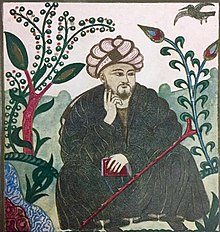Al-Farabi
Al-Farabi (Turkis: Farabi, Arabic: ابو نصر محمد بن محمد الفارابي Abū Naṣr Muḥammad ibn Muḥammad Al Fārābī;[1] for ither recorded variants o his name see ablo), kent in the Wast as Alpharabius[5] (c. 872[2] in Fārāb[3] – atween 14 December, 950 an 12 Januar, 951 in Damascus),[3] wis a Turkic renained filosofer an jurist wha wrote in the fields o poleetical filosofie, metapheesics, ethics an logic.
| Muslim scholar Abū Naṣr Muḥammad ibn Muḥammad Fārābī[1] | |
|---|---|
 | |
| Teetle | The Seicont Teacher[2] |
| Born | c. 872[2] Fārāb on the Jaxartes (Syr Darya) in modren Kazakhstan or Faryāb in Khorāsān (modren day Afghanistan).[1] |
| Died | c. 950[2] Damascus[3] |
| Ethnicity | Turkic |
| Era | Islamic Golden Age |
| Releegion | Islam |
| Main interest(s) | Metapheesics, Poleetical filosofie, law, Logic, Muisic, Science, Ethics, Mysticism,[2] Epistemology |
| Notable wirk(s) | kitāb al-mūsīqī al-kabīr ("The Great Beuk O Muisic"), ārā ahl al-madīna al-fāḍila ("The Virtuous Ceety"), kitāb iḥṣāʾ al-ʿulūm ("On The Introduction O Knawledge"), kitāb iḥṣāʾ al-īqā'āt ("Clessification O Rhythms")[2] |
Influenced
| |
References
🔥 Top keywords: Main PageAshley StorrieCarles PuigdemontMarie AntoinetteSpecial:RecentChangesSpecial:SearchWikipedia:Commonty YettWikipedia:Contact usJaney GodleyScots leidFile:Nvidia logo.svgFile:KFC logo.svgWarld War IISuzuki EsteemWikipedia:AbootThe Lion KingFile:FC Barcelona (crest).svgHelp:ContentsFacebookKFCFile:Starbucks Corporation Logo 2011.svgFile:Manchester City FC badge.svgConstellationWikipedia:General disclamationPortal:Current eventsWikipaediaToyota AgyaSpecial:MyTalkWikipedia:Mercat CrossContact lensWikipedia:Apryle 2024 Writin DriveFile:Real Madrid CF.svgThe Selkirk GraceChief executive officerUiser collogue:AmaryllisGardenerGujaratWikipedia:Walcome, ane an awScotlandJordan Frieda